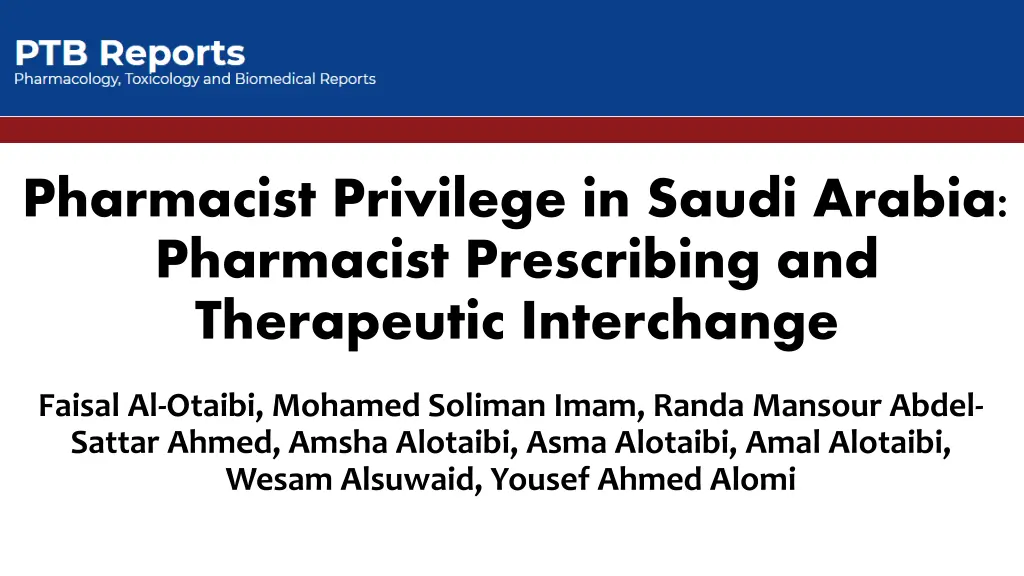
Pharmacist Privilege in Saudi Arabia: Prescribing and Therapeutic Interchange
Discover the current status of pharmacist privilege in Saudi Arabia with a focus on pharmacist prescribing and therapeutic interchange. The study conducted a survey across hospitals to assess medication prescribing practices, with recommendations for improving pharmacist roles in the healthcare system.
Download Presentation

Please find below an Image/Link to download the presentation.
The content on the website is provided AS IS for your information and personal use only. It may not be sold, licensed, or shared on other websites without obtaining consent from the author. If you encounter any issues during the download, it is possible that the publisher has removed the file from their server.
You are allowed to download the files provided on this website for personal or commercial use, subject to the condition that they are used lawfully. All files are the property of their respective owners.
The content on the website is provided AS IS for your information and personal use only. It may not be sold, licensed, or shared on other websites without obtaining consent from the author.
E N D
Presentation Transcript
Pharmacist Privilege in Saudi Arabia: Pharmacist Prescribing and Therapeutic Interchange Faisal Al-Otaibi, Mohamed Soliman Imam, Randa Mansour Abdel- Sattar Ahmed, Amsha Alotaibi, Asma Alotaibi, Amal Alotaibi, Wesam Alsuwaid, Yousef Ahmed Alomi
Objectives: To survey the pharmacist privilege in Saudi Arabia with an emphasis on pharmacist prescribing and therapeutic interchange. Methods: This is a 4-month cross-sectional survey of pharma cists privilege in Saudi Arabia. The study consists of two parts: the first part collects demographic information and the second part comprises 28 questions divided into four domains. These domains were derived from the previous literature and from the standards and regulations described by the American Society of Health- System Pharmacists (ASHP). The domains were privilege management and resources, pharmacist prescribing and therapeutic interchange, clinical and administration privilege, drug monitoring and healthcare education. We used 5-point Likert response scale system with close-and open-ended questions to obtain responses. The questionnaire was distributed in an electronic format to the director of pharmacy of various hospitals, deputy director, pharmacy quality manage ment, clinical pharmacy coordinators, or any pharmacist assigned on behalf of hospital s director of pharmacy. The study discussed and analyzed pharmacist privilege in Saudi Arabia with an emphasis on pharmacist prescribing and therapeutic interchange. All data were obtained through the Survey Mon key system.
Results: The survey was distributed to 36 hospitals. The pharmacist privilege of prescribing was available only at 12 (32.14%) hospitals. over-the-counter (OTC) medications (19 (90.48%)) and vitamins (14 (66.67%)) were most of the medications with pharmacist privilege of prescribing followed by minerals (11 (52.38%)) and electrolytes (10 (47.62%)), whereas NSAIDs (23 (63.89%)), Vitamins (19 (52.78%)), electrolytes (17 (47.22%)) and antihistamine (15 (41.67%)) were through therapeutic inter change program. Most of the pharmacists prescribing medication was through ambulatory care clinic (19 (52.78%)) and when prescription was cosigned by the physician (19 (52.78%)). The average score of pharmacist privilege in the hospital s computerized physician order entry (CPOE) was 3.17 (63.46%), whereas the average score of pharmacist privilege in the hospital s CPOE alerting system was 2.97 (59.46%). Conclusion: In the Kingdom of Saudi Arabia, pharmacist privilege in prescribing medications is very low. Most of the medications prescribed by the pharmacist were OTC drugs. Thepharmacist privilege in the Computerized Physician Order Entry is not adequate. We highly recommend the imple mentation of a comprehensive pharmacist privilege system and regulations ed in Saudi Arabia.
KEYWORDS Pharmacist, Privilege, Prescribing, Therapeutic, Interchange, Activities, Saudi Arabia.
The pharmacist have prescribing privilege and therapeutic interchange utilization in the KSA. The pharmacist plays an active role in prescrib ing or perform therapeutic interchange of OTC medications through pharmacy law. The electronic entry of pharmacist privilege has not reach its optimal level. Full implementation of the comprehensive pharmacist privilege system and regulations through in-depth guidelines about pre scribing and therapeutic interchange is highly recommended in the KSA.
